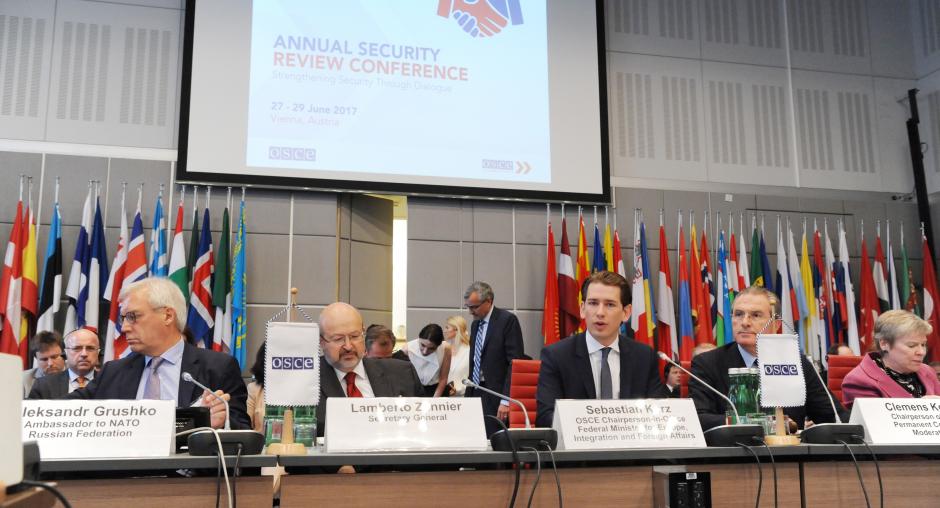Dialogue and compromise necessary for addressing security challenges, says OSCE Chairperson-in-Office at 2017 OSCE Annual Security Review Conference

VIENNA 27 June 2017 – Dialogue, co-operation and willingness to compromise are crucial to addressing the current security challenges, said OSCE Chairperson-in-Office and Austria’s Foreign Minister Sebastian Kurz as he opened the three-day 2017 Annual Security Review Conference in Vienna today.
Focusing on strengthening security through dialogue, the conference brings together high-level representatives of OSCE participating States, Partners for Co-operation and partnering organizations to discuss current security challenges in the OSCE area including the crisis in and around Ukraine, transnational threats, notably terrorism and cyber threats, as well as conventional arms control and confidence- and security-building measures.
"We have to defuse military conflicts in the OSCE area but we also have to stand together in fighting radicalisation, violent extremism and terrorism," said Kurz at the start of the conference.
Rose E. Gottemoeller, NATO Deputy Secretary-General, highlighted the role of the OSCE as “a pillar of the international rules-based order, and essential for continued peace and security in Europe.” She also expressed concern regarding the security station in Ukraine saying that “nearly 10,000 Ukrainians have been killed and the violence continues every single day.”
“The rules-based order has helped to keep the peace in Europe for more than seven decades – the longest such period in Europe’s history. It should be maintained and strengthened,” added Gottemoeller.
In his speech, Aleksandr Grushko, Russia’s Ambassador to NATO provided an outlook of his country’s efforts to ensure European security since the end of the ‘cold war’. He stressed the need to unite the endeavours of all OSCE participating States to confront joint threats and challenges, and to overcome the logic of ‘dividing lines’. Grushko also stressed the current lack of communication with regard to the NATO-Russia Council as well as the need to resume the culture of genuinely collective and mutually respective co-operation.
During the conference, a special session will focus on the Structured Dialogue on the Current and Future Challenges and Risks to Security in the OSCE Area, a process launched at last year’s OSCE Ministerial Council in Hamburg, which addresses challenges and risks in the wider politico-military sphere and explores possibilities of reversing the negative trends in the European security architecture.
Referring to this, Lamberto Zannier, OSCE Secretary General, said that one of the Structured Dialogue’s major objectives is to identify avenues to overcome the long-standing impasse in the discussions on conventional arms control and confidence- and security-building measures.
“We really have no choice but to intensify our efforts to find ways for pragmatic engagement on common challenges and to pursue the long-term aim of reviving co-operative security as we once knew it,” said Zannier.
